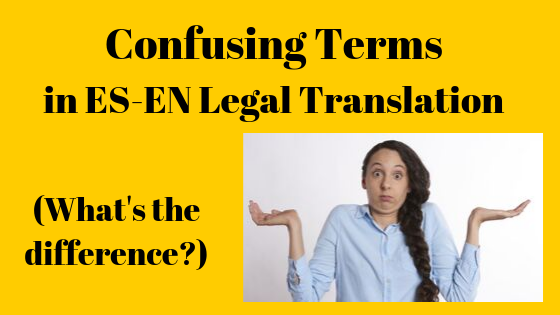
“At first blush,” as they say, “capacity” would appear to be a logical translation for capacidad. But I recently saw “legal capacity” equated with both capacidad jurídica and capacidad de obrar (which are clearly not the same), so I thought it was worth exploring this matter in a little more depth.
Capacidad jurídica vs. capacidad de obrar
Capacidad jurídica and capacidad de obrar are civil law concepts from the Law of Persons (Derecho de la persona). Capacidad jurídica is defined as la aptitud para ser titular de derechos y obligaciones (por el solo hecho de ser persona y que comienza con el nacimiento y termina con la muerte del sujeto) no susceptible de restricciones o limitaciones. It is the capacity to have rights and obligations, to be the titular de derechos y obligaciones. Everyone born, and throughout their lifetime, has capacidad jurídica.
In contrast, capacidad de obrar is la aptitud para ejercer derechos y asumir obligaciones, susceptible de restricciones o limitaciones. This is the capacity to exercise the rights and assume the obligations that capacidad jurídica bestows on each person at birth. Mentally competent adults (mayores de edad no incapacitados) have this plena capacidad de obrar. Non-emancipated minors or adults adjudicated incompetent (menores no emancipados e incapaces) still have all of the rights inherent in capacidad jurídica but the exercise of those rights is susceptible to restrictions and limitations, requiring the consent or assistance of a representative, such as a parent or guardian (progenitor o tutor) to enable them to validly enter into legal transactions (realizar válidamente cualquier acto jurídico), i.e., to exercise their capacidad de obrar.
In view of the above, I think we can abandon hope of translating these concepts with simple two-word expressions. Capacidad jurídica may perhaps be rendered as “legal capacity,” but the context may require further explanation, such as noting that it is the “capacity to be the subject of rights and obligations acquired at birth.” And if capacidad jurídica is “legal capacity,” then capacidad de obrar is the “capacity to exercise legal capacity,” or perhaps (resorting to a definitional rendering) the “capacity to exercise rights and assume obligations.”
Capacidad para ser parte vs. capacidad procesal
These are often considered the procedural law counterparts of the Civil Code capacidad jurídica and capacidad de obrar. Capacidad para ser parte is defined as la capacidad para ser titular de derechos, obligaciones y cargas procesales como demandante o demandado en un proceso. In contrast, capacidad procesal refers to the capacity to actually appear at trial and fully participate in legal proceedings, defined as capacidad para comparecer en juicio y poder realizar actos procesales válidos. Examples of persons who lack this capacity to appear at trial include minors, the mentally incompetent, spendthrifts and the unborn (menores, incapaces, pródigos y los concebidos y no nacidos), who would have to appear at trial represented by a parent, guardian or a court-appointed guardian ad litem (progenitor, tutor o defensor judicial).
These concepts are equally difficult to render into English. Capacidad para ser parte might be described as the “capacity to be a party to a proceeding,” while capacidad procesal might be expressed as the “capacity to appear at trial,” neither of which admittedly reflects the complexity of the legal concept in Spanish. It should also perhaps be noted that capacidad procesal has sometimes been confused with “standing,” which in Spanish is legitimación, a term that may likewise warrant a future blog entry.
In summary, translators need to be aware of the differences between capacidad jurídica/capacidad de obrar and capacidad para ser parte/capacidad procesal, while hoping and praying that we never have to actually translate these concepts.
Incapacidad
In this context, perhaps we should also look at some of the terminology relating to “incompetency proceedings,” or what in Spanish law is known as the proceso de declaración de incapacidad. In this context, incapacitación and declaración judicial de incapacidad denote a judge’s “adjudication of incompetence.” And a “person adjudicated incompetent” (persona judicialmente incapacitada) is known as an incapaz (“incompetent”). As explained above, such persons cannot directly exercise their capacidad de obrar or capacidad procesal and must do so through a representative.
Other standard expressions with capacidad
There are several other expressions in which capacidad can probably be safely rendered directly as “capacity”:
- capacidad para contratar; capacidad contractual (contractual capacity; capacity to contract)
- capacidad matrimonial (capacity to marry)
- capacidad para suceder (capacity to inherit)
- capacidad para testar (testamentary capacity)
- capacidad convencional (capacity to negotiate and enter into a collective bargaining agreement)
Sources for the definitions provided above: (the Spanish) Código Civil; Carlos Lasarte, Principios de Derecho Civil I, Madrid, Marcial Pons; (the Spanish) Ley de Enjuiciamiento Civil; and Víctor Moreno Catena, Derecho Procesal Civil-Parte General, Valencia, Tirant lo Blanch.
Additional concepts and terminology from Léxico temático de terminología jurídica español-inglés:
- capacidad jurídica/capacidad de obrar (pp. 567-568)
- capacidad para ser parte/capacidad procesal (pp. 123-124)
- incapacidad; incapacitación (pp. 186-187; 568)





